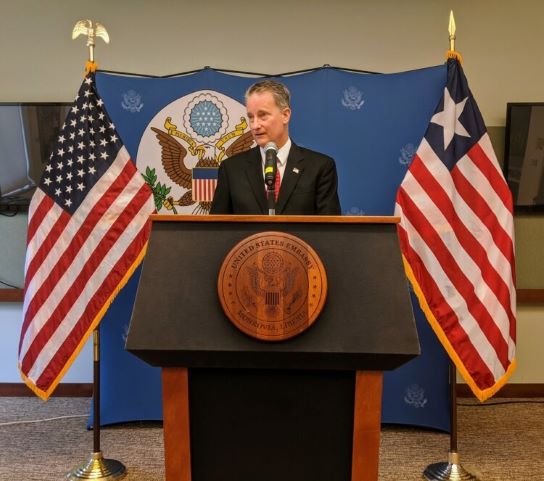PHOTO: US Amb. Michael McCarthy
In an open letter to Liberia today, US Ambassador in Monrovia, Michael McCarthy has assured people of this West African state that the American government’s commitment to “anti-corruption efforts remain robust and continuous’ although there is no new sanctions but he has not ruled out future imposition of sanctions on corrupt Liberian officials.
His open letter coincides with International Anti-Corruption Day and comes weeks after the US government-funded Millennium Challenge Corporation release the 2023 scorecard on Liberia disclosing that the country made a successful pass in several indicators including control of corruption, civil liberties, controlling inflation as well as the Rule of Law.
Below is the American diplomat’s open letter to Liberia:
For Immediate Release
December 8, 2022
Today is International Anti-Corruption Day
An Open Letter From U.S. Ambassador to Liberia Michael A. McCarthy
Nine months ago, I asked the purposefully provocative question, “What would J.J. Roberts have to say about Liberia today?” which helped spark a conversation about where this country finds itself 175 years after independence, and 200 years since the arrival of American settlers. Now on December 9, International Anti-Corruption Day, and at the close of the bicentennial year, I believe it may be helpful for Liberians to take another honest look in the mirror.
Even though we are announcing no new U.S. sanctions here today, I want to assure the Liberian people that our anti-corruption efforts remain robust and continuous. As the Global Magnitsky sanctions of three Liberian officials in August demonstrated, the U.S. government can and will employ sanctions as needed on an ongoing basis, in support of our shared development, democracy, and security goals, guided by the U.S. Strategy on Countering Corruption. The allimportant goal of transparent, free, credible, and peaceful elections in October will be one important factor in decisions about additional sanctions in the months leading up to the vote.
Global Magnitsky, or GloMag, sanctions are deservedly a hot topic in Liberia. Some Liberians have urged the United States to implement more sanctions and even proposed names; others have objected that the sanctions process lacks due process. Let me be clear: GloMag is a tool the United States uses to protect itself from particularly corrupt actors, not a punishment against a country or government. It is also in no way a substitute for a domestic judicial process in the host country, including prosecution. Ultimately, “due process” or an accused’s “day in court” can only happen under Liberian law, in Liberian courts.
Liberians generally agree with our analysis that corruption is the primary cause of Liberia’s failure to thrive; most in the international community share that assessment. That is why our Department of the Treasury took the extraordinary step of sanctioning five senior Liberian officials in only three years under GloMag. This set of sanctions has led to some positive results, including the resignation of the three most recently sanctioned officials. In our GloMag sanction announcements, Liberians have heard unusually stark language from the Government of the United States regarding the corruption of these individuals. In some cases, Liberians have also heard responses from the sanctioned officials themselves.
In the upcoming 2023 elections, however, it will be the turn of the people of Liberia to let their voices be heard on this topic, especially since several of those sanctioned officials may be running for office. Ultimately, it is Liberians and not the U.S. government that are responsible for ensuring good governance in Liberia. Sanctions can help, but the ballot box is a far more important tool for holding officials accountable. If Liberians choose to elect or re-elect sanctioned officials as their leaders, that will send a very clear signal about how they truly feel about the fight against corruption and the future of their country.
As I’ve said many times before, corruption is not a uniquely Liberian problem – it is a global issue, and one that we suffer from in the United States at all levels of governance. However, today, on International Anti-Corruption Day, it is worth considering what more Liberians can do to fight this scourge. I believe there are many urgent steps the government of Liberia can take now to fight corruption that require no international assistance, many of which are in fact already enshrined in law. Fully funding Liberia’s integrity institutions, publishing the names of public officials who fail to comply with asset declarations, making information on all legislative votes and actions easily accessible to the public, and reducing funding for government agencies that do not comply with annual financial reporting requirements, are but a few examples. But there are many others.
On today of all days, we must together acknowledge that corruption in Liberia can be immediately and dramatically curtailed BY LIBERIANS, without any assistance from the United States or other donors, if that is something the government and people of Liberia truly want. Where there’s a will, there’s a way! I commend all Liberians who are truly committed to this noble effort.

